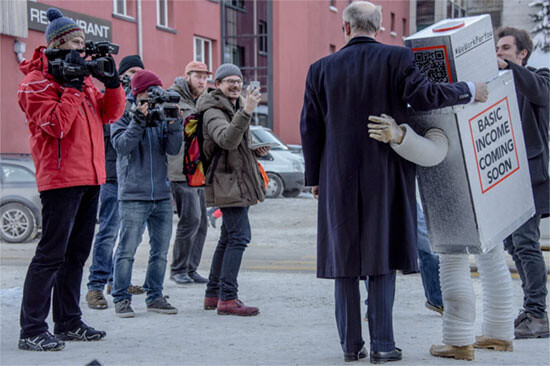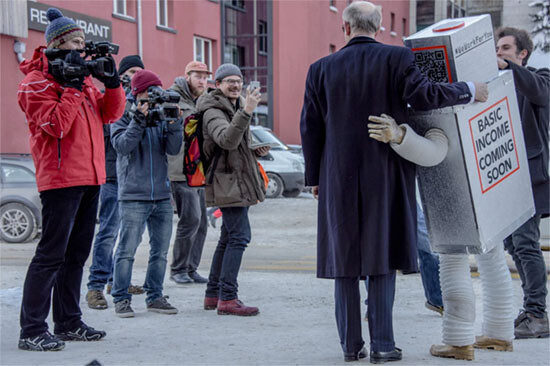Continued from “The Vectoralist Class”
In the first part of this essay I presented the history of commodity production as passing through three overlapping stages, each of which entailed a bifurcation into two classes, which polarizes the social field. In each stage, that field has a certain definitive quality. The rise of industry, and the struggle between worker and capitalist, produces a more abstract topography, a second nature. The rise of information and the struggle between hacker and vectoralist produces an even more abstract topology, a third nature. This space becomes a global topology in which almost any point can connect to any other, mobilizing resources on a planetary scale.
At each stage, the field of class conflict might have a certain polarity between the principle dominating and dominated classes, but all classes across all three “natures” interact, as if in a game of three-dimensional chess. In many instances the key class conflict may be between different ruling classes. The unity of the three dominated classes can also never be guaranteed. They are not a multitude, but distinct classes with different functions in the production process.
With this understanding in place, it is possible to reframe a somewhat confused debate about whether to imagine historical change in terms of a force that would negate the relentless drive of commodification, or rather would accelerate it towards its end. Neither, as we shall see, offers much in our times by way of renewing the historical imagination.
Particularly in the Western or Hegelian Marxist tradition, the proletariat is a force that is supposed to negate capital.1 The proletariat bursts out from inside the commodity form which traps it as just another thing and realizes its full subjectivity and universal humanity. The particular act of blockage that is the strike is thus either a precursor or a limit on thinking the total blockage to be an act of will of the proletariat as revolutionary subject of history, rising out of, and refusing, its objectification.
With the failure of the revolutions of the late sixties, Deleuze, Guattari, Lyotard, and Negri started to think more in terms of an acceleration of capitalism towards its end.2 This was really a frank admission of the weakness of labor and the loss of its power to block and stop, let alone to totally negate, the flows of commodified life. The idea was instead to press the development of capitalism to its limit, which is indeed what seemed to have occurred.


To its detractors, acceleration smells too much like the much derided if never clearly spelled-out bad other that is neoliberalism. It seems too close to the ideology of what in our terms is a fraction of the vectoralist class, that which claims to be about “tech,” and which wants to pivot and disrupt and generally creatively destroy the world for fun and interest. However, it could be pointed out that in many ways this ideology is just as much about negation. It is just that the vectoralist class ascendancy wants to destroy the last vestiges of the power of both capital and labor, and subordinate both to control through information.
The problem is more that both negation and acceleration are limited forms of historical imagination. Negation is a figure that presupposes that there is only second nature. There is only capital and its negation by the proletariat. Acceleration is a figure that presupposed that there is only third nature. There is only the abstraction beyond second nature. It is not a form of historical imagination that has grasped the development of new class relations on this terrain.
Both negation and acceleration neglect the problem of the limits to the transformation of nature by both second and third nature. The historical imagination of negation makes a fetish of the social, as if it were not embedded in both nature and techne. The historical imagination of acceleration in its earlier versions makes a fetish of desire, and in its later iterations of a technical rationality. Desire was never thought together with need; rationality was never thought through the property form and hence class relations in which it appears in third nature.
Neither had much to say about the vast metabolic rifts opening up through the operation of second and third nature on their natural substrate.3 The best known of these is molecular flows of carbondioxide and methane into the atmosphere, caused by fossil fuels and livestock. The intensive development of second nature, followed by the command of any and all of the world’s resources that third nature enables, causes entropic feedback into the whole global production and reproduction process.4 Indeed, the vectoralist class now feeds off the very entropic disorder that it produces. Thus, human, social, and technical history can no longer be imagined independently of natural history.
Only an alliance of all the subordinated classes could ever hope to confront this potentially catastrophic development of third nature under the domination of the vectoralist class. Such an alliance would need to clearly identify new vulnerabilities, given that few of the old choke points of the factory or even the “social factory” of the city can “derail” a power that does not depend on rails but rather on the more flexible topology of the information vector. It may have been symbolically and poetically helpful to say “occupy Wall Street”—but it is rather more difficult to do in practice. How do you occupy an abstraction?
Thinking about history in terms of either negation of acceleration leaves out too much of the picture. These are views which not only neglect certain key features of third nature, they miss what is crucial in our times about nature itself. The era of third nature is one that commands not only all of second nature as a resource, but all of nature as well. Moreover, all of nature becomes the exhaust, the heat sink, the dumping ground, for all of the entropic waste products of a now planetary scale of abstract social production.
What if history can be neither negated nor accelerated? Perhaps second and third nature have been built so broad and so deep that there’s no getting around this infrastructure. Thus while the commodity economy keeps plodding along, at its own relentless pace, it forms agents of any class in its own image and obliges them to work in the forms it determines. What if even the vectoralist class had little power anymore over its own creation?
This would be to think then about the inertia of history. Jean-Paul Sartre offers a brilliant account of this, in his own distinctive language, here translated into the language of this text.5 Collective social endeavor, first in agriculture, then industry, then information, built an infrastructure over and against itself, which then shapes those ongoing efforts to its calcified forms. All that is solid might melt into air, but it precipitates back out of the gaseous into the solid state again as more of the same.


The commodity form drives labor to create not only the product of the moment but an infrastructure that endures and that has the commodity form embedded in itself. Thus it shapes action on and in and through it into its own form, stripping collective effort of its social character and robbing it of the capacity to change it. Action becomes, even as action, a form of passivity, in which each action appears separated from all others, as mere individual action, for which there can be only individual rewards.
Hence there is no negation, as the infrastructure itself does not afford much by way of action that could confront it with a qualitative break in its form. And hence there is no acceleration, as the infrastructure of second and third nature alike determine the pace at which change is to happen, and moreover shape change as simply more of the same. Acceleration is no more capable of rendering a qualitative break than negation.
This paraphrase of Sartre is as bleak as the original, if not quite in the same rich language. Sartre held out some hope for a kind of action that would fuse individual wills and get them out of the solipsistic and unrelated separation from each other. In Sartre this is the fused group—an idea that shows up in modified form as Guattari’s subjective moment or Badiou’s subject-forming event.
In any case, this line of thought about historical action still bets heavily on a collective human action, or even a posthuman rationality in and against an infrastructure whose very form absorbs and renders inert such activity. The paradox of third nature is thus that it does indeed accelerate and proliferate transactions of a commodified type, but always of the same type. The flexibility and precarity it generates on the surface is the effect of a deep and wide infrastructural immobility.
This is where the disruptive capacity of collective endeavor, whether the farmer’s riot, the worker’s strike, or the hacker’s exploit, has to be acknowledged to be a limited and one-sided view of historical action.6 Which brings us to a fourth term, implied as a gap left over in the matrix of the other three. If the attempt to negate or accelerate history runs up against the inertia of the infrastructure on which it runs, then perhaps it’s a question not of braking or speeding that infrastructure, but of designing a different one.


The infrastructures of second and third nature have taken on the form of commodity exchange and embedded it into every aspect of everyday life. The design of a different one has to look elsewhere. Perhaps the natural history of forms can here come to the rescue of the social history of forms, now that the latter have come to be endless clones and servants of the one form, just of an ever more abstract nature.
This is a perilous path, as it is almost impossible to avoid projecting backwards onto natural forms the habits of thought of second nature and now third nature. In the industrial era, liberal capitalism and the steam engine shaped an image of nature as a Darwinian free market. In our own time, neoliberal vectoralism and the computer shape a different image of nature, but one no less a matter of substituting images from the world of production onto nature itself as a petit-bourgeois struggle of “selfish genes.”


What would it mean, then, to understand nature from the points of view not of the dominant classes but of the dominated? To think nature as the farmer or the worker or the hacker might, as symbiotic practices of transforming, respectively, matter, energy, and information? Might it be possible to use the collective struggles of three stages of the commodity economy to critique the dominant worldviews that have emerged about nature, but not to stop there? The task for the historical imagination is to move on, and attempt to extrapolate from what can be known about natural forms the possible morphologies for the design of a new infrastructure.7
So, the bad news: the juggernaut that is third nature cannot be negated, as its very form is dedicated to routing around any specific points at which action could be effective. Nor can it be accelerated. There is no subordinate class in a position to push it further or faster than it goes of its own accord. Thinking history from the point of view of the product rather than the producers flips the picture around and shows that the cumulative heft of what collective endeavor has built is what stands in the way of its own transformation.
Which leaves only the option of redesigning it on the fly. This would require collaborative action among the subordinated classes. The differences among such classes cannot be wished away by branding it the multitude or by imposing by fiat a kind of philosophical universalism. It means an approach to coalition building that is more about economic agents than merely political ones, as in most versions of radical democracy.8 It is time to build a new infrastructure within the ruins of the old.
See, for example, Georg Lukács, History and Class Consciousness (Cambridge, MA: MIT Press, 1972) and Guy Debord, The Society of the Spectacle, trans. Donald Nicholson-Smith (New York: Zone Books, 1994). Interestingly, the latter is only partly a theory of history as negation. The last chapter, on détournement, rather points in other directions.
Benjamin Noys, Malign Velocities (Winchester: Zero Books, 2014); #Accelerate: The Accelerationist Reader, eds. Robin Mackay and Armen Avanessian (Falmouth: Urbanomics, 2014).
On metabolic rift, see: John Bellamy Foster, Marx’s Ecology: Materialism and Nature (New York: Monthly Review Press, 2000); John Bellamy Foster et al., The Ecological Rift (New York: Monthly Review Press, 2010).
See Robert Biel, The Entropy of Capitalism (Chicago: Haymarket Books, 2013).
Jean-Paul Sartre, Critique of Dialectical Reason, Vol. 1 (London: Verso, 2004).
On precapitalist forms of revolt, see Eric Hobsbawm, Primitive Rebels (London: Norton, 1965). On forms of revolt of the hacker class, see Alex Galloway and Eugene Thacker, The Exploit (Minneapolis: Minnesota University Press, 2007) and Gabriella Coleman, Hacker, Hoaxer, Whistleblower, Spy (Brooklyn: Verso, 2014).
I take the concept of extrapolation from Joseph Needham, Time: The Refreshing River (London: Allen & Unwin, 1948).
For the classic statement of radical democracy, see Ernesto Laclau and Chantal Mouffe, Hegemony and Socialist Strategy (London: Verso, 2014).

